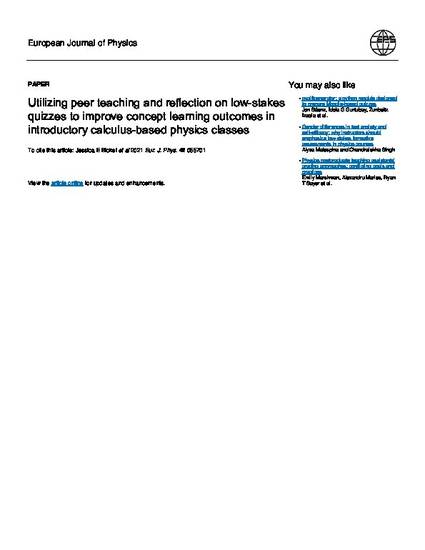
Article
Utilizing peer teaching and reflection on low-stakes quizzes to improve concept learning outcomes in introductory calculus-based physics classes
EUROPEAN JOURNAL OF PHYSICS
(2021)
Abstract
There are a number of different research-based teaching methods that instructors can use to improve student learning outcomes. This work examines a modification of peer quizzing that introduces a reflection element. Students take individual quizzes and then are allowed to redo part of the quiz while working with a partner. By allowing the students to choose which problems they will redo, the students must pause and reflect on which concepts (problems) they do and do not feel confident about. The results show that there is a clear benefit to introducing weekly quizzes as measured by the Hake gain score on concept assessment tests. Further, a multivariate least squares regression indicates that a student's gain score can be predicted by their exam mean, quiz mean, and their mean improvement on the quiz redo. Thus, students who score above average on their quiz redos will also show above average concept assessment gains. An analysis of when and how the students are changing their answers demonstrates that students across the spectrum (both high- and low-achieving) benefit from the quiz redo and that all students are engaged in teaching their peers. Finally, we see evidence that it is not single students teaching their peers, but rather that peer instruction is bidirectional and can even result in situations where two wrongs make a right. Overall, these results suggest that interventions aimed at students with low quiz redo scores for their quiz grade may have a significant impact in helping student learning.
Keywords
- physics education,
- peer quizzing,
- peer instruction,
- metacognition
Disciplines
Publication Date
2021
DOI
10.1088/1361-6404/ac0321
Citation Information
Jessica E. Bickel and Thijs Heus. "Utilizing peer teaching and reflection on low-stakes quizzes to improve concept learning outcomes in introductory calculus-based physics classes" EUROPEAN JOURNAL OF PHYSICS Vol. 42 Iss. 5 (2021) Available at: http://works.bepress.com/thijs-heus/42/